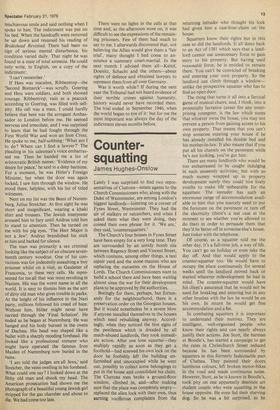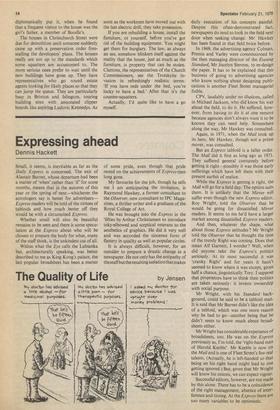Counter
squatting
James Hughes-Onslow
Lately I was surprised to find two representatives of Cluttons—estate agents to the Church Commissioners who, along with the Duke of Westminster, are among London's biggest landlords—loitering on a corner of Fynes Street, Westminster. They had the air of stalkers or ratcatchers, and when I asked them what they were doing, they coined their own phrase for it. 'We are,' they said, 'countersquatters.'
The Church's four houses in Fynes Street have been empty for a very long time. They are surrounded by an untidy bomb site between Regency Street and Vincent Street, which contains, among other things, a taxi repair yard and the stone masons who are replacing the statuettes on the House of Lords. The Church Commissioners want to build a school there and have been waiting almost since the war for their development plans to be approved by the authorities.
Boringly for them, perhaps, but fortunately for the neighbourhood, there is a preservation order on the Georgian houses. But it would nonetheless be a severe blow if anyone installed themselves in the houses which need rebuilding anyway. Accordingly, when they noticed the first signs of the pestilence which is dreaded by all much-abused landlords, they took immediate action. After one lone squatter—they multiply rapidly as soon as they get a foothold—had screwed his own lock on the door he foolishly left the building unfurnished and unoccupied while he went out, possibly to collect some belongings to put in the house and consolidate his claim. The Cluttons men broke a ground-floor window, climbed in, and—after making sure that the place was completely empty— replaced the alien lock with their own, thus gaming vociferous complaints from the returning intruder who thought his lock had given him a cast-ironclaim on the house.
Squatters know their rights but in this case so did the landlords. It all dates back to an Act of 1381 which says that a landlord cannot use unnecessary force to gain entry to his property. But having used reasonable force, he is entitled to remain there. You can't be convicted of breaking and entering your own property. So the landlord can climb through a window— unlike the prospective squatter who has to find an open door.
The thing that turns it all into a farcical game of musical chairs, and, I think, into a potentially lucrative career for any enterprising youngster, is the law which states that whoever owns the house, you may not prevent a person from gaining access to his own property. That means that you can't stop someone entering your house if he has already installed his double bed and his mother-in-law. It also means that if you put all his chattels on the pavement while he's not looking, you've got him.
There are many landlords who would be too embarrassed to be caught indulging in such unseemly activities;_ but with so much money wrapped up in property development surely they could hire lively youths to make life unbearable for the squatters. The intruder has such an enormous range of accommodation available to him that you scarcely need to put the furniture on the pavement or turn off the electricity (there's a test case at the moment to see whether you're allowed to do that) in order to persuade them that they'd be better off in someone else's house. Just tinker with the telephone.
Of course, as a squatter told me the other day, it's a full-time job, a way of life. You can't go on holiday or even take the day off. And that would apply to the counter-squatter too. He would have to occupy the place continuously for several weeks until the landlord moved back or started whatever redevelopment he had in mind. The counter-squatter would have his client's assurance that he would not be sued for breaking and entering but in any other brushes with the law he would be on his own. In return he would get free accommodation and a fee.
In combating squatters it is important to understand their motives. They are intelligent, well-organised people who know their rights and can nearly always justify their actions. Joe Stott, the barman at Boodle's, has started a campaign to get the rates in Christchurch Street reduced because he has been surrounded by squatters in this formerly fashionable part of Chelsea. They painted their doors luminous colours, left broken motor-bikes in the road and made continuous noise. However, Stott, as he is known in Boodle's, took pity on one apparently destitute art student couple who were squatting in the house opposite. He even fed their starving dog. So he was a bit surprised, as he
diplomatically put it, when he found that a frequent visitor to the house was the girl's father, a member of Boodle's.
The houses in Christchurch Street were due for demolition until someone suddenly came up with a preservation order forestalling the developers' plans. The houses really are not up to the standards which some squatters are accustomed to. The more serious ones prefer to wait until the new buildings have gone up. They have representatives who go round estate agents looking for likely places so that they can jump the queue. They are particularly busy in Brixton and Islington, touring building sites with annotated clipper boards like aspiring Ludovic Kennedys. As soon as the workmen have moved out with the last electric drill, they take possession.
If you are rebuilding a house, install the furniture, or yourself, before you've got rid of the building equipment. You might get them for burglary. The law, as always an ass, somehow blinkers itself against the reality that the house, just as much as the furniture, is property that can be stolen. Cluttons, the representatives of the Church Commissioners, see the Trotskyite invasion in refreshingly realistic terms: 'If you have reds under the bed, you're lucky to have a bed.' After that it's the counter-squatters.
Actually, I'd quite like to have a go myself.



































 Previous page
Previous page